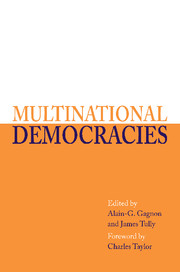Book contents
- Frontmatter
- Contents
- Notes on the contributors
- Foreword by Charles Taylor
- Acknowledgements
- Introduction
- Part I Justice and stability in multinational democracies
- Part II Struggles over recognition and institutions of accommodation
- 5 Federalism, federation and collective identities in Canada and Belgium: different routes, similar fragmentation
- 6 Recognition claims, partisan politics and institutional constraints: Belgium, Spain and Canada in a comparative perspective
- 7 Ethnoterritorial concurrence in multinational societies: the Spanish comunidades autónomas
- 8 Mutual recognition and the accommodation of national diversity: constitutional justice in Northern Ireland
- 9 Federalist language policies: the cases of Canada and Spain
- 10 Competing national visions: Canada–Quebec relations in a comparative perspective
- Part III Modes of reconciliation and conflict management
- References
- Index
8 - Mutual recognition and the accommodation of national diversity: constitutional justice in Northern Ireland
Published online by Cambridge University Press: 06 October 2009
- Frontmatter
- Contents
- Notes on the contributors
- Foreword by Charles Taylor
- Acknowledgements
- Introduction
- Part I Justice and stability in multinational democracies
- Part II Struggles over recognition and institutions of accommodation
- 5 Federalism, federation and collective identities in Canada and Belgium: different routes, similar fragmentation
- 6 Recognition claims, partisan politics and institutional constraints: Belgium, Spain and Canada in a comparative perspective
- 7 Ethnoterritorial concurrence in multinational societies: the Spanish comunidades autónomas
- 8 Mutual recognition and the accommodation of national diversity: constitutional justice in Northern Ireland
- 9 Federalist language policies: the cases of Canada and Spain
- 10 Competing national visions: Canada–Quebec relations in a comparative perspective
- Part III Modes of reconciliation and conflict management
- References
- Index
Summary
Northern Ireland is an ethnically and culturally plural political jurisdiction marked by a deep conflict of nationality. Its citizens are divided into two national communities with opposing political aspirations, differing identities and divergent loyalties. Ever since this jurisdiction was brought into existence in 1921 with the partition of Ireland, it has struggled to establish its legitimacy as part of the United Kingdom by failing to gain the allegiance of a large and growing minority of its citizens, namely those who aspire to some form of Irish national unity. At the same time, the unionist majority have maintained that they would face the prospect of political marginalization and cultural exclusion if they were to be forced, as a national minority, into a united Ireland. The dominant tendency within both national traditions has been to deny legitimacy to the aspiration of the other.
This failure of mutual recognition has been the key source of the tension and strife between national communities that has, since the late 1960s, been at the root of a protracted armed conflict. In the absence of a mutually acceptable constitutional settlement to accommodate these conflicting national aspirations, Northern Ireland has been blighted not only by violence but by a chronic instability that has inflicted serious damage on its prospects for economic, social and political development. Hopes that a settlement might be within reach were raised by the 1994 paramilitary cease-fires that have been key elements of a peace process underway since the early 1990s.
- Type
- Chapter
- Information
- Multinational Democracies , pp. 222 - 241Publisher: Cambridge University PressPrint publication year: 2001
- 4
- Cited by



